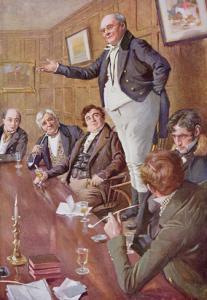 The group discussion in your class has gotten smaller, pandemic or whatever other reason. If the ideal group from my experience is around twelve, how does one lead a smaller group?
The group discussion in your class has gotten smaller, pandemic or whatever other reason. If the ideal group from my experience is around twelve, how does one lead a smaller group?
How does one make the less-more?
Remind oneself of why one is engaging in a dialectic discussion.
The dialectic student is the person who has sometime, someplace, somewhere caught a glimpse of beauty. This beauty left him discontent with the world, the flesh, or devils. He wants more, even if he too often settles for less. Dialectical education, the college of Hellenism, is the way to pursue that love to consummation.
The small group can be almost as good as the “ideal” discussion group. After all, Socrates often had conversations with one or two students. He was not building program, a ministry, or a movement. He talked to those that would talk. He dialogued where he could.
I get to discuss in my office, fairly quiet, but Socrates was stuck in a market place, loud and uncomfortable. The perfect discussion, Jesus with twelve disciples, must never be the enemy of the best we can do in a pandemic: foolish me with six very excellent students.
What to do?
First, they do not need a guru. Nobody ever needs a guru. That means that the fewer the students the less one should say. The tutor will be more dominate (by mere math) in a smaller class. As a result, the teacher must speak less. My Dad gave spiritual wisdom to fifty years of folks and often had to say: “share less.” People always were going about sharing their reality, detail, after detail, after detail. In a small group, everyone will speak more often, but must (oddly) be more disciplined, bringing us to the second point.
The author is a discussant and can provide variety. This always is true in a discussion about a book, but comes with a deeply enlivening role in a small group discussion. A big group chock full of souls in God’s image will provide enough eccentricity and personal variety on a weekly basis to keep the discussion vibrant. This is not possible in a small group. In fact, the eccentric (the Pickwick) must reign in his quirks or risk driving people mad. There is too much too easily in a small group for the full force of a Pickwick. The author is the sane personality to whom a small group must always turn. If you get to know Plato, then you will never run out of wonder and love for a discussant.
Finally, be strong, stand firm, be courageous, be alert. The small group might start easily if the group is full of chatty and smart people. Any group with a good book that will persevere probably ends well as the group learns to make a verity of smallness and to stay focussed. The small group surely suffers a lag in the middle where everyone has said all the easy things to say and ends up staring at each other uncomfortably silent. Endure. Keep trying, Let the weeks roll on and eventually new ideas will be born and new paths found in the text. Boredom is necessary to any group, as that marks the moment that all old ideas run out, but that moment comes very early and lasts a very long time in a small group.
To any teacher facing such challenges this term:
Keep alert, stand firm in your faith, be courageous, be strong.












